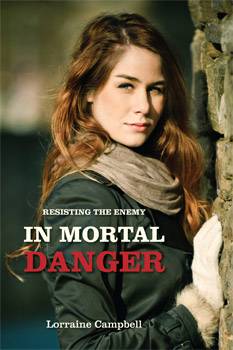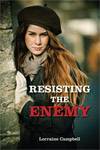In Mortal Danger

In Mortal Danger
The second YA novel from Lorraine Campbell, In Mortal Danger continues the story of Valentine de Vaillant (Valli) as life under the German Occupation becomes even more dangerous for those in the Resistance.
For Valli, living under the same roof as the enemy, there is now an added danger. The more she comes to know Maximilian von Stahlmann, the harder it becomes to resist her growing feelings for him. When her dearest friend, Marguerite, is arrested, Valli faces her most perilous situation yet. Time is running out. In order to save her friend, she must risk everything. Be willing to do whatever it takes. Even if it means putting her own life in jeopardy. But for Valli, the price of freedom is never too high.
A thrilling story of conflict, danger and passion, In Mortal Danger is the second book in the series.
What Makes A True Heroine?
For me, true heroism only occurs when the stakes are high. I'm not talking about particular acts of bravery, or endurance, or winning an Olympic gold medal. The actions of a true heroine have to matter. Have the capacity to move us in the most profound ways.
I believe the true heroine has an unshakeable belief in freedom, truth and justice. She has the courage to stand up for those beliefs, whatever the cost, and without fear of the consequences.
I've chosen three examples from recent history who, for me, are standouts.
Sophie Scholl. Sophie's story is enough to break your heart.
She was a member of the 'White Rose" – a small resistance group in Nazi Germany. It consisted mainly of students from the University. Just a bunch of kids, really. They printed and distributed handbills, calling for Germans to rise up and resist the tyranny of their own government. They also conducted a graffiti campaign on the streets and buildings all over Munich: 'Hitler the Mass Murderer…Freedom…"
Little enough, one might think, in terms of resistance. But at that time the Nazis maintained an iron grip over the whole of German society. Internal dissent was quickly and efficiently smashed by the Gestapo. Sophie and her friends well knew what would happen if they were caught.
Their campaign lasted eight months. In February 1943, their luck ran out. Six members, including Sophie and her brother Hans, were arrested by the Gestapo. They were tried for treason and beheaded.
At her trial, Sophie said: 'Finally someone has to make a start. We only said and wrote what many people think. They just don't dare express it."
The chief executioner would later testify he had never seen anyone die so bravely as Sophie Scholl. She walked to the guillotine without a tremor or whimper of fear. The steel blade came crashing down and Sophie said goodbye to the beautiful life she might have led. She was only twenty-one years old.
Rosa Parks. A forty-two-year-old African-American from Montgomery, Alabama, who 'stood up for her rights by remaining seated."
Rosa, a seamstress, was travelling home from work one day on a segregated bus. When the bus became crowded, the driver ordered Rosa to give up her seat for a white passenger. She refused. The police were called and Rosa was arrested for civil disobedience. Her brave act of defiance set in motion the Montgomery Bus Boycott. It was a watershed moment in the American Civil Rights Movement and helped launch nationwide efforts to end segregation.
Rosa became an iconic symbol of standing up for one's rights. Her actions inspired countless other women throughout the world to do the same. Rosa said: 'I had no idea that history was being made. I was just tired of giving up."
Nancy Wake. An Australian who fought in the French Resistance. Relatively unknown in her own country, yet her countless acts of bravery and courage made her the Allies' most decorated servicewoman of World War 2.
Nancy, once married to a wealthy Frenchman, living a life of luxury in Marseille, became the Gestapo's most wanted person. They code-named her 'The White Mouse" because of her ability to elude capture. After being trained by Britain's SOE, she became a Resistance fighter. She was put in charge of an army of 7,000 Maquis troops, engaging in sabotage and guerrilla warfare against the Nazis.
After the War, she received numerous international honours, included the Chevalier de la Légion d'honneur, France's highest decoration. The RSL recommended she be awarded a medal, but successive Australian Governments turned them down. Nancy, with typical Australian humour, once remarked: 'They can stick their award and be thankful it's not a pineapple!"
One day, after the War, she was waiting on a street corner in Paris. The gendarme on point duty happened to catch sight of her Légion d'honneur medal. He immediately held up traffic in all directions while he waved Nancy safely across the road. The French know how to honour their heroes.
These were three ordinary women who found themselves in extraordinary circumstances. We must remember, when needed, every young girl – and every woman – has the potential to be a heroine. We just need to identify that quality in ourselves, before it's diminished by outside forces.
Lorraine Campbell is a licensed shorthand writer and has worked for seventeen years as a Court Reporter with the Victorian Government Reporting Service, providing verbatim transcripts of court proceedings. She is currently working for a freelance transcript provider. She has a Bachelor of Arts Degree from Monash University, majoring in Philosophy and English Literature, and has studied German and French for a number of years.
A resident of Melbourne's Bayside, Lorraine adores the opera and is an avid moviegoer. She also likes to keep fit and runs every morning along the beach and in the local parks.
Mortal Danger
Palmer Higgs
Author: Lorraine Campbell
ISBN: 9780992549343
RRP: $24.95
Interview with Lorraine Campbell
Question: How does Mortal Danger lead on from Resisting the Enemy?
Lorraine Campbell: The seeds of romance that were reluctantly sewn in Resisting the Enemy have now begun to grow in earnest. But so too have Maximilian's suspicions about Valli's resistance activities. While Resisting the Enemy was told entirely from Valli's perspective, In Mortal Danger allows the reader to see things from Maximilian's point of view. He too is a loyal patriot. And now he's faced with a choice between his feelings for Valli and his duty as a German officer to report her to the Gestapo.
For Valli, her worst fears are now realised. Her dearest friend, Marguerite is arrested. With the Gestapo closing in, she has to make decisions. What are her true feelings for Maximilian? And what if he is their only hope?
Question: Which heroine inspired you most?
Lorraine Campbell: They both inspired me equally, but in very different ways. In Resisting the Enemy, we follow Valli as she negotiates that transition from twelve-year-old schoolgirl, through her teenage years, to emerging adulthood. Surviving the agonies of first love. Learning how to take risks. The stratagems she develops in order to deal with tragedy and loss. This younger heroine, of course, is key to the Valli we see in Mortal Danger. A young woman whose courage is now put to the test. Who faces life and death situations every day. And now, of course, finding herself in the most dangerous situation of all: engaging emotionally with the enemy.
Question: How much of your inspiration comes from real life and real people?
Lorraine Campbell: I draw a great deal of inspiration for my characters from real life. People I've known – whether it be family, friends, lovers, mentors, acquaintances. They're all there in some form or another. Not directly recognisable, of course – except to a very few! Mostly they're an amalgam. Of course, how they develop on the page as characters, what they say and do, how they react to events, that's all a product of my imagination.
Like most writers, you draw on your knowledge about all manner of things. What interests you, what you're passionate about, what you've discovered as you go through life, your own personal experiences, your dreams, your fantasies. You make use of it all in bringing your characters to life.
Question: What did you enjoy most about creating the character of Valentine de Vaillant?
Lorraine Campbell: Bringing a creature of my imagination to life. As a writer, you develop a very strong relationship with your characters. You think about them a lot. Most of the time. In fact you become totally obsessed with them. For me, Valli became a real person. It was as though she had a mind of her own, and she was speaking and leading her life, but at the same time I was very much involved in leading her life with her.
What I also loved was the idea that perhaps this imaginary character of mine might influence young girls in positive ways. Inspire them to stand up for what they believe in, whatever the cost, and without fear of the consequences. We must remember, when needed, we all have the potential to be a heroine. We just need to identify that quality in ourselves, before it's diminished by outside forces.
Question: What's next, for you?
Lorraine Campbell: I've just completed the final draft of my third novel, due for release later this year. It takes up the story of one of the minor characters who appears in In Mortal Danger. The setting is the 1960s – -The Swinging Sixties' – that amazing time in our history when everything was changing. A good deal of the action takes place in the Melbourne Law Courts, but the story also encompasses various other locations: Paris, Tel Aviv, Crete, Rio de Janeiro. Essentially, it's about one young woman's desire to unlock the secrets of her past and her quest for justice and retribution.
Interview by Brooke Hunter
Have You Seen This?
MORE






